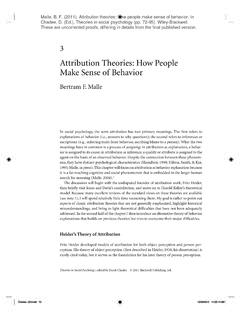Transcription of An Attributional Theory of Achievement Motivation and …
1 Psychological Review1985, Vol. 92, No. 4, 548-573 Copyright 1985 by the American Psychological Association, Attributional Theory of Achievement Motivation and EmotionBernard WeinerUniversity of California, Los AngelesA Theory of Motivation and emotion is proposed in which causal ascriptions playa key role. It is first documented that in Achievement -related contexts there are afew dominant causal perceptions. The perceived causes of success and failure sharethree common properties: locus, stability, and controllability, with intentionalityand globality as other possible causal structures.
2 The perceived stability of causesinfluences changes in expectancy of success; all three dimensions of causality affecta variety of common emotional experiences, including anger, gratitude, guilt, hope-lessness, pity, pride, and shame. Expectancy and affect, in turn, are presumed toguide motivated behavior. The Theory therefore relates the structure of thinking tothe dynamics of feeling and action. Analysis of a created motivational episode in-volving Achievement strivings is offered, and numerous empirical observations areexamined from this theoretical position.
3 The strength of the empirical evidence,the capability of this Theory to address prevalent human emotions, and the potentialgenerality of the conception are 1645, Miyomota Musashi was contem-plating the causes of his past success as a war-rior. In A Book of Five Rings he mused,When I reached thirty I looked back on my past. The pre-vious victories were not due to my having mastered it was natural ability, or the order of heaven, orthat other schools' strategy was inferior.
4 (1645/1974, p. 35)About 275 years later, and approximately11,000 miles away, the editors of ScientificAmerican were wondering why America wasflourishing. They reasoned, "The wealth andgeneral prosperity of the country are largelydue to the intelligence and energy of its people,but it can hardly be disputed that it is equallydue to the natural wealth of the country" (Staff,1926, p. 228). Unfortunately, battles are lostas often as they are won, and countries undergoeconomic decline as well as enrichment.
5 Dur-ing our recent financial recession the Los An-geles Times reported,Timber industry experts blame high interest rates, thehousing slump, tough logging regulation, and expansionThis article was written while the author was supportedby Grant MH38014 from the Public Health Service,National Institute of Mental author wishes to thank Sandra Graham for herhelpful comments on an earlier draft of this for reprints should be sent to Bernard Weiner,Department of Psychology, University of California, LosAngeles, California the Redwood National Park for their sorry state.
6 TimSkaggs, the union business agent, shrugged. 'You couldspend a lifetime fixing blame,' he said. (Martinez, 1982,Pt. 5, p. 1)And even the former coach of my favoritefootball team found it necessary to soul searchabout causality following a series of from the Los Angeles Times:Here it is Thanksgiving week, and the Los Angeles Ramsare looking like the biggest turkeys, in town. Coach RayMalavasi has eliminated bad luck, biorhythms, and sun-spots as the reasons why his football team has lost 9 of itslast 10 games.
7 Now he's considering the unthinkable pos-sibilities that: (a) he has lousy players or (b) they aren'treally trying. (Robert, 1982, Pt. 3, p. 3)Why this constant pursuit of "why"? Anumber of explanations come to mind (seeForsyth, 1980; Weiner, 1985). We might justwant to know, that is, to understand the en-vironment, to penetrate ourselves and our sur-roundings. This familiar motivational inter-pretation is known as the principle of mastery(White, 1959). In addition, it clearly is func-tional to know why an event has occurred.
8 AsKelley (1971) stated, "The attributor is notsimply an attributor, a seeker after knowledge;his latent goal in attaining knowledge is thatof effective management of himself and his en-vironment" (p. 22). Once a cause, or causes,are assigned, effective management may bepossible and a prescription or guide for futureaction can be suggested. If the prior outcome548 Achievement Motivation AND EMOTION549was a success, then there is likely to be an at-tempt to reinstate the prior causal the other hand, if the prior outcome orevent was undesired such as exam failure,social rejection, political loss, or economic de-cline then there is a strong possibility thatthere will be an attempt to alter the causes toproduce a different (more positive)
9 For mastery and functional search,two of the generators of causal exploration, donot seem to specifically characterize one geo-graphical area or one period of human Japanese warrior in the Middle Ages andtoday's union representative are engaged in thesame endeavor: attempting to assign , one might argue that adaptation is notpossible without causal analysis. The warriorneeds to know why he is winning battles so hecan survive the next one, just as the union rep-resentative needs to explain why the industryis doing poorly in order to urge wiser actionsin the future.
10 Because of the apparent pan-cultural, timeless aspect of causal search andexploration, and because of the evident adap-tive significance of this activity, causal ascrip-tions are proposed to provide the buildingblocks for the construction of a Theory of mo-tivation and article advances an Attributional theoryof Motivation and emotion, with achievementstrivings as the theoretical focus. Initially, themost salient causes of success and failure inachievement-related contexts are basic properties of these causes, or thestructure of causal thinking, is then deter-mined from both a dialectic and an empiricalperspective.










